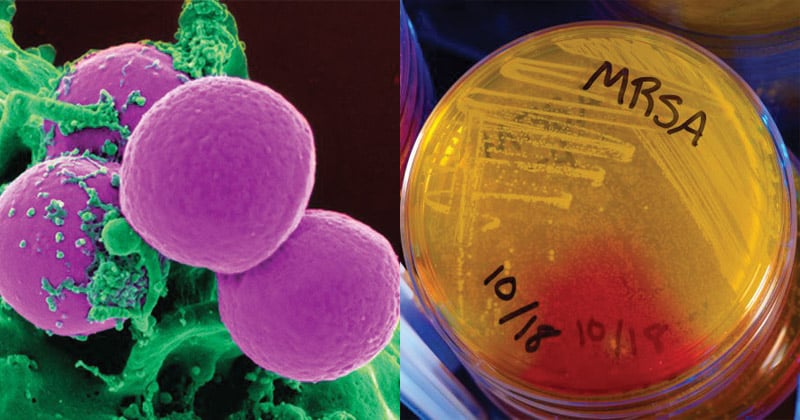MRSA is mediated by the mecA gene; which is chromosomally coded. It alters penicillin-binding protein (PBP) present on S. aureus cell membrane to PBP-2a:
- PBP is an essential protein needed for the cell wall synthesis of bacteria. β lactam drugs bind and inhibit this protein, thereby inhibiting cell wall synthesis.
- The altered PBP2a of MRSA strains has less affinity for β lactam antibiotics; hence MRSA strains are resistant to all β lactam antibiotics.
- BORSA strains (Borderline Oxacillin resistant S. aureus): Occasionally a non-mecA gene-mediated low-level resistance to oxacillin is observed in some strains of S.aureus, which is due to hyperproduction of β lactamase.
- There is an increasing trend in the MRSA rates over the last few decades. Though it varies from place to place, overall about 30–40% of strains of S. aureus are MRSA.
- MRSA rate in India is 30-40%. It is lowest in Scandinavian countries.

Interesting Science Videos
Types of MRSA
MRSA are either community or hospital-associated.
Community-associated MRSA (CA-MRSA)
- It is mediated by the mecA gene subtype IV, V, VI.
- They are usually more virulent and express several toxins such as PV toxin.
- They cause invasive skin and soft tissue infections such as necrotizing fasciitis.
Hospital associated MRSA (HA-MRSA)
- It is mediated by the mecA gene subtype I, II, III.
- They are multidrug-resistant (but their virulence is low).
- They cause perioperative wound infections in hospitals and nosocomial outbreaks (hospital staff are the major carries).
Note: CA-MRSA and HA-MRSA terminologies are becoming artificial nowadays; as many CA-MRSA strains have been isolated in hospitals and vice versa.
Detection of MRSA
- Antimicrobial susceptibility test: Disk diffusion test can be done by using cefoxitin or oxacillin disks.
- Cefoxitin is the recommended disk to be used.
- If an oxacillin disk is used, then certain conditions to be maintained such as—using media containing 2–4% NaCl, incubation at 30 °C for 24 hours.
- Oxacillin screen agar: Adding oxacillin 6 μg/ml and NaCl (2–4%) to the medium.
- PCR detecting mecA gene.
- Latex agglutination test detecting PBP-2a
Treatment of MRSA
- Vancomycin is the drug of choice for MRSA.
- Alternate drugs include:
- Teicoplanin, linezolid, quinupristin-dalfopristin, tigecycline, oritavancin.
- Daptomycin (for endocarditis and complicated skin infections),
- Mupirocin 2% ointment (for nasal carriers of MRSA).
- However, even simple orally effective drugs such as tetracycline, erythromycin, or cotrimoxazole may also be effective. These can be indicated in non-serious conditions, caused by CA-MRSA strains if found to be susceptible based on antimicrobial susceptibility report.
- All β lactam drugs should be avoided. However, 5th generation cephalosporins, such as Ceftobiprole, ceftaroline, ceftolozane have shown some activity against MRSA.
References
- Apurba Sankar Sastry and Sandhya Bhat K (2018). Review of Microbiology and Immunology. Sixth Edition. Jaypee Brothers Medical Publishers (P) Ltd. ISBN: 978-93-86322-39-5.

Simple, yet very informative
Its very useful
Simple & useful
Thank you, 🙂
Very useful 🙌👍